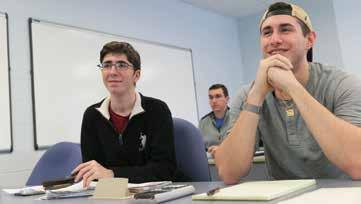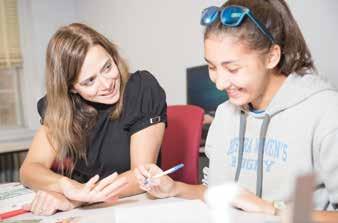
6 minute read
Center for University
Advising
To help students adjust to new expectations and stay on track, Hofstra has developed a comprehensive advising system that supports students from orientation through graduation. During New Student Orientation, students are assigned an advising dean from the Center for University Advising (CUA). This dean serves as the student’s general advisor throughout the student’s time at Hofstra, and provides advice about goal-setting, academic planning, course selection, and major exploration. In addition, a student’s advising dean can suggest out-of-classroom activities that will complement a student’s academic interests. Advising deans can also help students who are having difficulty in a class find the resources they need. When students declare a major, they work closely with a faculty advisor in their academic department for all concerns related to their major. Faculty or major advisors are able to help students plan their course of study and can also act as mentors while students explore a discipline, consider opportunities for research or graduate studies, or contemplate future careers.
Advertisement
The CUA also assists students who are considering advanced studies in either law or health-related professions, such as medicine, dentistry, nursing, optometry, podiatry, or veterinary medicine. Such students should express their interests in these professions to their advising dean as soon as possible, to begin planning for the various requirements necessary for entering these kinds of programs. For more information, call the CUA at 516-463-6770.
Navigate
The Navigate platform is a digital tool that puts student success within easy reach. Navigate provides students with a personalized experience, with access to academic planning, to-do lists, and events, and quick access to advisors and faculty who can help them succeed. Navigate includes midsemester advisories that notify students if they are not meeting expectations in a class. By combining technology, best practice research, and predictive analytics, Navigate helps students connect with faculty and advisors early in the semester while they can still improve their grades.
What can Navigate do for students?
• Schedule appointments
• Connect with advisors and faculty
• Set personal reminders
• Find events offered by various on-campus offices

• Explore majors and career paths
• Plan future semesters with the Academic Planning tool
Students can access Navigate through the Hofstra portal (my.hofstra.edu) or download the mobile app.
Center for Academic Excellence
The Center for Academic Excellence (CAE) is dedicated to helping students achieve success in their academics and overall college experience. The CAE promotes improved academic performance and student persistence through strategies that lead to active learning, engagement, and selfregulation. The CAE staff works closely with students, faculty, and departments within the Division of Student Enrollment, Engagement, and Success and throughout the University to proactively and efficiently identify and implement strategies to bolster students’ academic and personal success.
Academic Success Programs (ASP), including the Undergraduate Tutorial Program (UTP), are available to all enrolled undergraduate students. Academic success involves learning to ask for help early and using the resources that are available on our campus. In addition to using resources offered through the Academic Success Programs, students are encouraged to meet with a success advisor.
Academic Success Programs
As part of our Academic Success Programs (ASP), Hofstra University offers individual and group tutoring for undergraduate students in many subjects, free of charge, through the Undergraduate Tutorial Program (UTP). The UTP is internationally certified by the College Reading and Learning Association (CRLA). The undergraduate tutors who lead the tutorial sessions are in excellent academic standing and have shown proficiency in the subjects they tutor. Students may request one-on-one sessions with tutors and/or participate in small group sessions. Tutorial support for biology, chemistry, astronomy, physics, computer science, and business statistics are provided in the form of small-group sessions only. Students can receive tutoring for 90 minutes per class in up to three classes per week. The goal of the Undergraduate Tutorial Program is to sharpen the skills of all undergraduate students, regardless of their academic standing. Students interested in requesting a tutor can schedule appointments through the Hofstra portal, using Navigate. In addition, ASP offers a variety of student success workshops throughout the year. For more information about those programs or the UTP, call 516-463-2000 or visit hofstra.edu/utp.
Writing Center
Our mission at the Writing Center is to work with Hofstra undergraduate and graduate student-writers of varying experience, learning styles, and linguistic backgrounds. We work in and across disciplines. We support students’ growth as writers through one-on-one sessions with tutors trained in collaborative learning practices.
Located in Room 102 Mason Hall, the Writing Center offers free, confidential, one-on-one writing support to all Hofstra students. Our diverse staff of undergraduate, graduate, and faculty tutors help writers at any stage in the writing process, including brainstorming ideas, organizing paragraphs, using evidence, and employing strategies for revision. For further information, call the Writing Center at 516-463-4908 or visit hofstra.edu/writingcenter.
Student Access Services
Student Access Services (SAS) works to ensure that Hofstra University is an environment where individuals with disabilities have equal access to programs, activities, and all other opportunities. SAS arranges academic accommodations and provides support for students with physical, learning, and/or psychological disabilities. To access services, students must first formally disclose their disability by registering with the office and then must submit appropriate documentation for review. Staff members are available to help students with the registration process and then work with students to determine which accommodations are appropriate for their needs at the college level.
In addition to arranging accommodations, a major part of the mission of SAS is to help students develop the skills they need to be effective self-advocates at Hofstra and beyond. SAS programs and services encourage active involvement from students in managing their own disabilities, while offering coaching and support along the way. SAS also administers the Program for Academic Learning Skills (PALS) and Academic Coaching program (please see the following sections).

Parents and family members of students registered with Student Access Services are welcome to attend webinars coordinated by the SAS Parent Support Network each semester; events are announced in the Family Link e-newsletter.

Reasonable accommodations are provided free of charge to all eligible students who complete the SAS registration process. For more information about applying for reasonable accommodations through SAS or to access SAS forms, visit hofstra.edu/sas, call 516-463-7075, or email SAS@hofstra.edu

Mathematics Tutoring Center
Administered by the Mathematics Department as a free service to students, the Mathematics Tutoring Center is staffed by advanced undergraduates and, occasionally, by professors. Students are welcome to visit the center in Room 301 Roosevelt Hall, South Campus, to study and ask questions as they arise. No appointment is necessary. Ordinarily, only one tutor is available at the center at any one time. The tutor works with individual students or with a small group of students.
Students taking MATH 6A, 40, 45, 50, 61, 61A, 71, and 72 benefit most from the services provided at the center. For more information, visit hofstra.edu/mtc
Pals
In 1979, Hofstra University established the Program for Academic Learning Skills (PALS), which is a fee-based program that students apply for at the point of admission. For the past 44 years, PALS has been serving Hofstra students with specific learning disabilities and ADHD. The program was built on the belief that Hofstra students with diagnosed learning disabilities would benefit from a combination of skills instruction and academic accommodations. Today, under the umbrella of Student Access Services (SAS), PALS continues its commitment to serving this student population.
PALS employs learning specialists who meet weekly with students in one-on-one sessions to assist them in developing supplemental learning strategies. These strategies are based on each student’s specific learning disability diagnosis and disability documentation. Because consistency is important in skill development, each student is assigned a learning specialist to work with for the full academic year. Meeting with a learning specialist is a mandatory PALS component for first-year students, but PALS students may access the services of their learning specialist as needed throughout their time at Hofstra. This element of the program is designed to provide students with skills they can apply directly to their coursework and use in the future. It is a gradual process aimed at helping students become independent, lifelong learners. Although there is no extra fee for reasonable accommodations, there is a fee for PALS for first-year students only; this fee is in addition to the other University tuition and fees. For additional information about PALS documentation requirements, call 516-463-7075 or email SAS@hofstra.edu.
Academic Coaching
Students who are receiving accommodations through SAS can also enroll in an optional, fee-based, semester-long program called Academic Coaching to further develop academic and study skills. This program is designed for students who may need additional support inside and outside the classroom and consists of regular one-on-one meetings with a learning specialist from SAS. The student’s Academic Coaching plan may address any or all of the following areas:
• Social adjustment to the college environment and its demands
• Time management skills
• Problem-solving skills
• Coping and stress management
• Reading and analysis strategies
• Test preparation and test-taking strategies
• Note-taking and other effective classroom strategies
• Executive function/planning strategies
• Learning style awareness and appropriate study methods
For more information, call 516-463-7075 or email SAS@hofstra.edu




